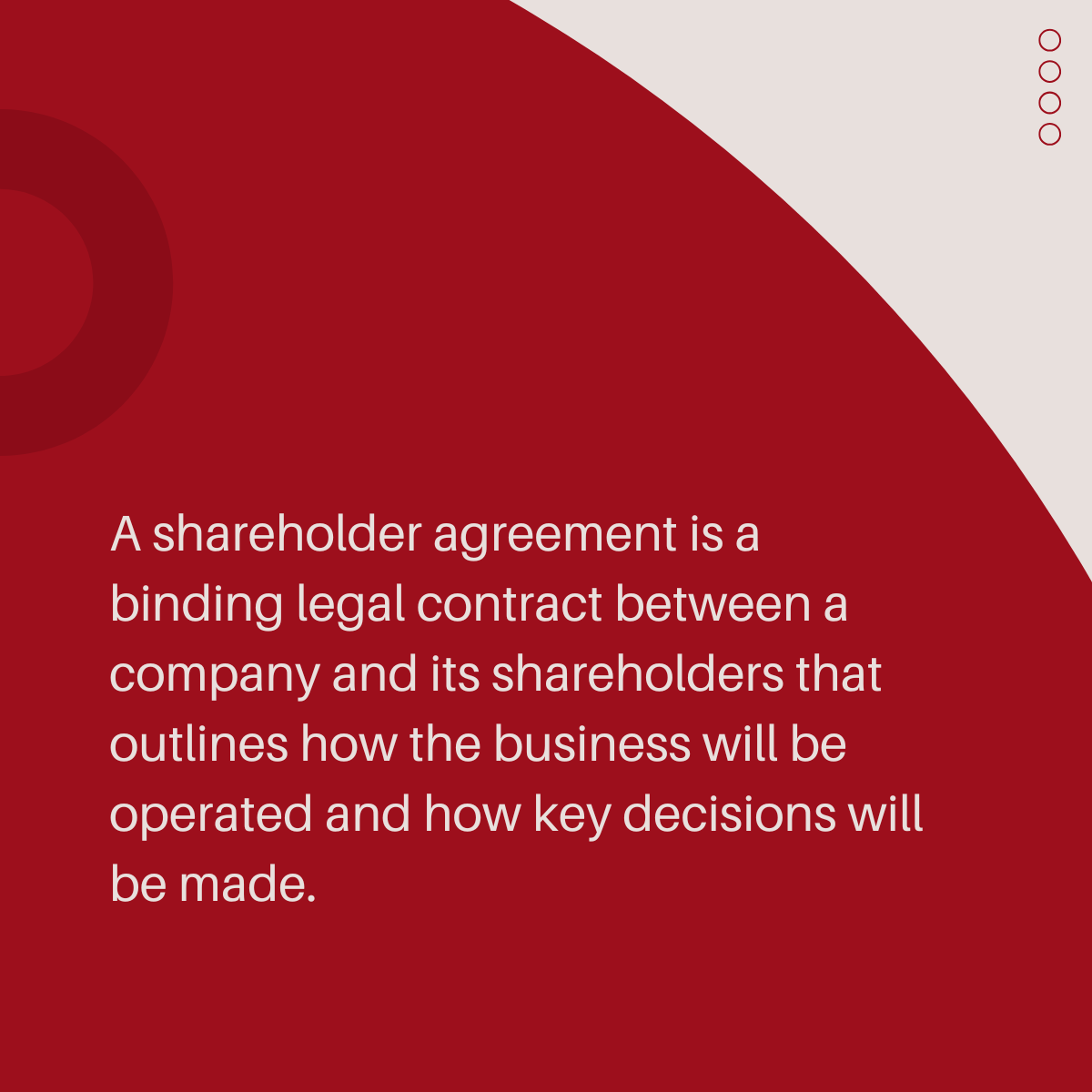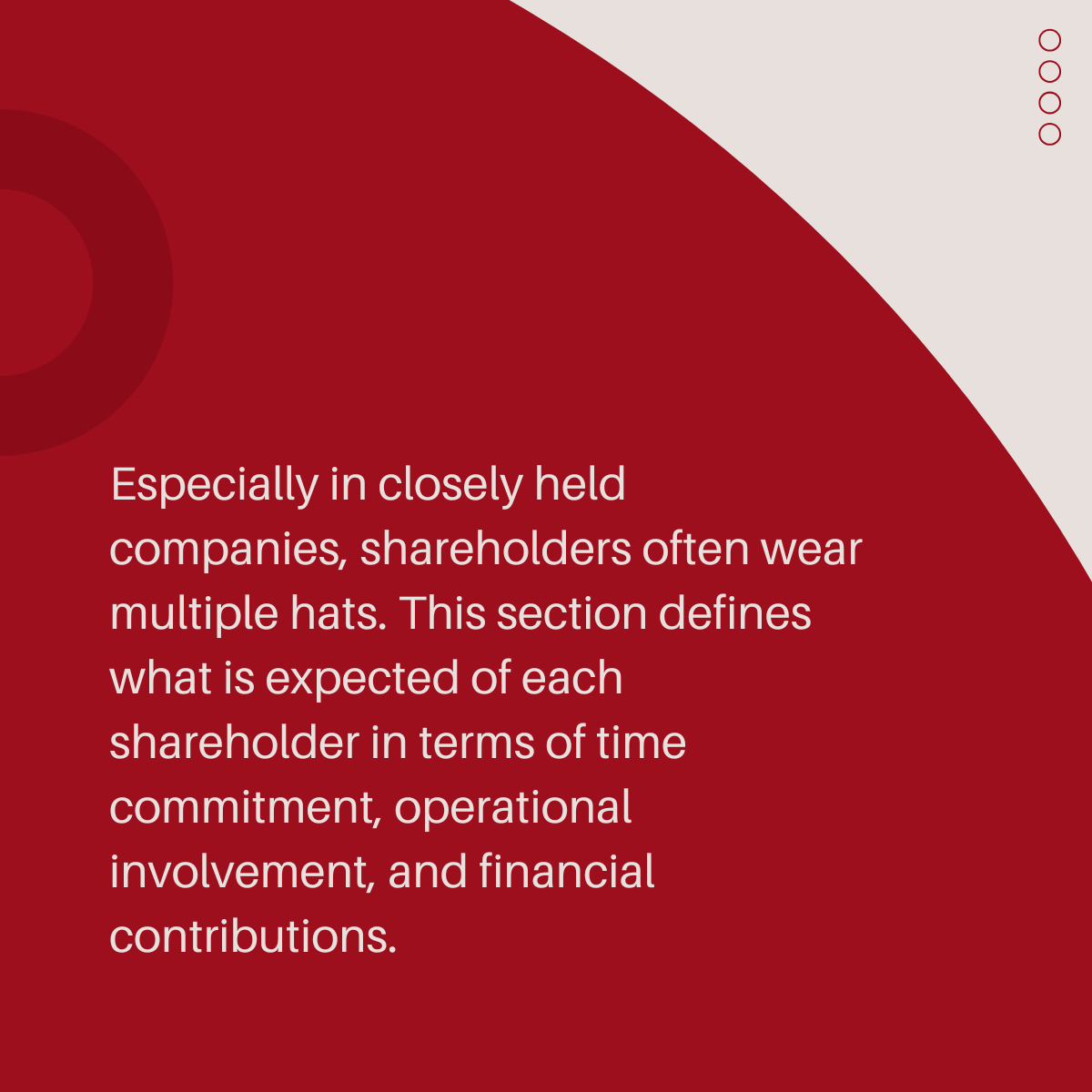
What’s The Purpose of Shareholder Agreements?
In any corporation with multiple owners, establishing clear expectations among shareholders is essential. A shareholder agreement serves as a foundational legal document that defines each shareholder’s rights, responsibilities, and protections.
From outlining decision-making processes to setting protocols for transferring shares, this agreement plays a vital role in preserving both the company’s structure and the interests of its owners.
Consulting with a knowledgeable business attorney or a reputable law firm ensures your shareholder agreement is comprehensive, enforceable, and tailored to your business’s specific needs.
What Is a Shareholder Agreement?
A shareholder agreement is a binding legal contract between a company and its shareholders that outlines how the business will be operated and how key decisions will be made. Unlike corporate bylaws, which govern the general operations of the company, a shareholder agreement focuses specifically on the rights and obligations of shareholders.
This agreement is particularly important for closely held corporations, where a small group of individuals holds ownership. It helps minimize disputes by clearly defining each shareholder’s role, voting power, and the rules for buying, selling, or transferring shares.
Whether you’re forming a new corporation or revisiting your company’s governance structure, a well-drafted shareholder agreement provides long-term protection and clarity.

Who Should Have a Shareholder Agreement?
Any business with more than one shareholder should consider a shareholder agreement, especially in the following situations:
Unequal Ownership Stakes
When shareholders hold different percentages of ownership, the agreement defines voting rights, control, and profit distribution to ensure clarity and fairness.
Complex Business Structures
Companies with multiple share classes, subsidiaries, or significant intellectual property need clearly defined terms to protect interests and streamline decision-making.
Family or Friends as Shareholders
Mixing personal relationships with business can lead to emotional complications. A shareholder agreement sets clear expectations and boundaries to help preserve relationships and prevent misunderstandings.
Active Shareholder Involvement
When shareholders are directly involved in the company’s operations or management, a formal agreement outlines roles, responsibilities, and decision-making authority.
Startups and Growing Businesses
As companies expand or seek outside investment, having a shareholder agreement in place helps support smooth transitions and future planning.

Core Purposes of Shareholder Agreements
A shareholder agreement serves several critical functions that help protect the business and its owners. These include:
Clarifying Ownership Rights and Responsibilities
The agreement defines each shareholder’s equity stake, voting rights, and role within the company, reducing ambiguity and potential disagreements.
Protecting Minority Shareholders
It ensures that minority shareholders have a voice in major decisions and are protected from being overruled or unfairly diluted by majority owners.
Establishing Decision-Making Protocols
The agreement outlines how key business decisions will be made, including voting thresholds for approving major actions such as mergers, acquisitions, or changes in leadership.
Setting Exit Strategies
Shareholder agreements often include buy-sell provisions that govern what happens if a shareholder wants to exit the company, becomes incapacitated, or passes away. These clauses help maintain stability and prevent ownership disputes.
Preventing External Ownership
Restrictions such as rights of first refusal can help ensure that shares are not sold to outside parties without offering them to existing shareholders first.
By addressing these core areas, a shareholder agreement provides a framework for smooth operations and future growth, especially when drafted with guidance from skilled business attorneys or law firms.
Key Clauses Often Included in Shareholder Agreements
While every agreement should be customized to the specific needs of the business, the following clauses are commonly included:
Voting Rights and Decision-Making Procedures
This clause outlines the voting power of each shareholder and defines how decisions are made, whether by simple majority, supermajority, or unanimous consent. It can also establish rules for board appointments, major expenditures, or changes to the company’s structure. Setting clear guidelines avoids confusion and helps maintain fair governance.
Restrictions on Share Transfers
To protect the company from unwanted third-party involvement, this provision sets limitations on how and to whom shares can be transferred. It may require that shares first be offered to existing shareholders or approved by the board before any sale. These restrictions help maintain control within the original group of owners.
Dividend Distribution Policies
This clause explains how and when profits will be distributed among shareholders. It can detail fixed dividend schedules, conditional distributions, or the company’s discretion in reinvesting profits. Establishing clear expectations here can prevent misunderstandings and disputes over financial entitlements.
Roles and Expectations of Shareholders
Especially in closely held companies, shareholders often wear multiple hats. This section defines what is expected of each shareholder in terms of time commitment, operational involvement, and financial contributions. It can also specify non-compete obligations and confidentiality requirements to protect business interests.
Dispute Resolution Mechanisms
Even with the most comprehensive agreement, disagreements can arise. Including a clause that mandates mediation or arbitration before resorting to litigation helps resolve conflicts efficiently and privately. This protects the company’s reputation and avoids the time and expense of court proceedings.

Is a Shareholder Agreement Necessary?
While not legally required in most states, a shareholder agreement can be useful for businesses. A well-drafted agreement offers a level of protection that verbal promises or informal understandings cannot. It provides structure, consistency, and legal enforceability, which are all essential for long-term stability. If you’re asking whether a shareholder agreement is necessary, the safer answer is almost always yes.
Work With DMAB: A Trusted Business Law Firm
At DMAB, we bring a practical, detail-oriented approach to corporate governance. Whether you’re launching a new venture, restructuring ownership, or simply preparing for future growth, our team is here to ensure your agreement supports both your goals and legal obligations. We serve businesses of all sizes across Southern California and are committed to delivering clarity, strategy, and peace of mind.
Contact us today to discuss how we can support your business with expert legal guidance.
